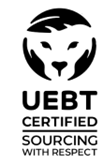
UEBT – Union for Ethical Bio Trade
The Union for Ethical BioTrade (UEBT) is a non-profit association created in 2007 to promote the “respectful sourcing” of ingredients from native biodiversity.

Union for Ethical Bio Trade – UEBT
About the standard
The Union for Ethical BioTrade (UEBT) is a non-profit association created in 2007 to promote the “respectful sourcing” of ingredients from native biodiversity. Members commit to gradually ensuring that their sourcing practices promote biodiversity conservation, respect traditional knowledge and ensure an equitable distribution of benefits throughout the supply chain. The idea behind the formation of the UEBT has three pillars:
-
The need, expressed by small and medium-sized companies in developing countries, to find ways to differentiate BioTrade products in the market.
-
The efforts initiated by the BioTrade Initiative of the United Nations Conference on Trade and Development (UNCTAD), which was created to contribute to international efforts to promote sustainable development and biodiversity conservation.
-
The recognition of the Convention on Biological Diversity (CBD), in relation to the need to develop additional efforts to reach the private sector. Likewise, the CBD recognizes the strong relationship between business and biodiversity.
Characteristics
The Ethical BioTrade Standard defines practices that promote sustainable business growth, local development, and biodiversity conservation. It encompasses:
-
Practices that promote biodiversity conservation by maintaining and restoring ecosystems and using biological resources sustainably. This includes measures that contribute positively and proactively to biodiversity conservation in sourcing areas, as well as actions that actively reduce any potentially negative impact generated by sourcing activities.
-
Practices aimed at contributing to local development by equitably sharing the benefits generated from biodiversity. This is achieved through fair trade practices and the distribution of benefits arising from biodiversity-based innovation and associated traditional knowledge.
-
Practices that seek to respect human rights, workers’ rights, and the rights of local and indigenous communities, as well as other rights related to natural resources.
-
Practices that address sourcing risks and improve the economic viability of companies and their products, ensuring that Ethical BioTrade businesses and their supply chains are socioeconomically sustainable.
-
Increasing consumer awareness, as well as demand for knowledge of sourcing and production practices.
Requirements
Contact UEBT for the application, and after the approval of its feasibility, choose a certification body.
Features
The fair and equitable distribution of the benefits obtained from biodiversity is one of the central objectives of the Convention on Biological Diversity (CBD). The CBD recognizes the significant environmental, economic and social value of biodiversity. It also seeks to ensure respect for the rights of countries and communities over their biological resources and related knowledge; as well as that the benefits obtained from its use are distributed equitably. The CBD thus establishes commitments to maintain the ecological base of the planet within a context of sustainable development strategies.

Documents
How does the Program work?
It depends on the organization, its scope, and its objectives. The standard provides its tools for entities wishing to implement an Ethical Sourcing System (ESS) internally without certification/verification purposes (Ethical sourcing system/ingredient/production line/supply chain). However, this ESS certification program will cease to operate in 2021, at which point UEBT will offer the natural ingredient certification program, UEBT/RA Herbs & Spices program, and membership verification.
Accredited Office Control Union Services S.A.C | Accreditation/Recognition Body: Recognized by: UEBT

How can we help you?
Want to apply for a certification program? Our Certification team will be happy to help you.